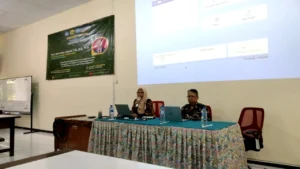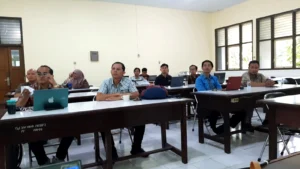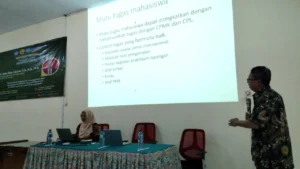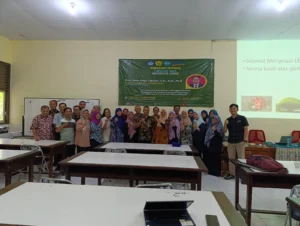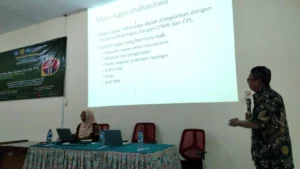 In an effort to ensure the quality of education at the Program Studi (PS) and Unit Pengelola Program Studi (UPPS) levels, FMIPA UNEJ held an internal workshop at FMIPA UNEJ in the Ecology R. Biology Department, FMIPA (3/5). Present as a resource person was Prof. Amin Setyo Laksono, S.Si., M.Si., Ph.D., from Brawijaya University Malang. Taking the theme “Kiat Praktis Menjamin Keunggulan dan Rekognisi PS dalam Penyelenggaraan Tri Dharma PT di Level Internasional” the workshop was attended by the Head of Department, Secretary of Department, Study Program Coordinator, and 5 representative lecturers for each study program at FMIPA UNEJ. Prof. Amin was accompanied by Deputy Dean of FMIPA, Dra. Hari Sulistiyowati, M.Sc., Ph.D., as the event moderator.
In an effort to ensure the quality of education at the Program Studi (PS) and Unit Pengelola Program Studi (UPPS) levels, FMIPA UNEJ held an internal workshop at FMIPA UNEJ in the Ecology R. Biology Department, FMIPA (3/5). Present as a resource person was Prof. Amin Setyo Laksono, S.Si., M.Si., Ph.D., from Brawijaya University Malang. Taking the theme “Kiat Praktis Menjamin Keunggulan dan Rekognisi PS dalam Penyelenggaraan Tri Dharma PT di Level Internasional” the workshop was attended by the Head of Department, Secretary of Department, Study Program Coordinator, and 5 representative lecturers for each study program at FMIPA UNEJ. Prof. Amin was accompanied by Deputy Dean of FMIPA, Dra. Hari Sulistiyowati, M.Sc., Ph.D., as the event moderator.
In his presentation, Prof. Amin explained the legal basis that is used as a reference for accreditation and why there is now conditional accreditation status. “Now, there is a conditional status to provide evaluation results that do not harm the study program and also to give the study program the opportunity to make improvements,” he initially said. It is also necessary to understand the assessment matrix and also know the weighting of items in order to know the highest points that can be achieved. “You can pay attention to the points and weights in service research as well as our student publications, also in the LKPS section,” said Prof. Amin is also the Head of Biology Masters Study Program, FMIPA, Brawijaya University, Malang.
At the workshop, participants were also invited to work together to correct and enable improvements for study programs applying for accreditation. Some parts that need a touch of improvement include portfolios, rubrics, CBL, and points about students. “Portfolios are an example because they are a mandatory part of learning tools that need to be prepared, from the RPS to creating class portfolios for each course,” continued Prof. Amen. In the following presentation, we discuss the preparation of rubrics, implementing CBL and PJBL, and also explain several learning models.
It also talks about measuring CPL, evaluating course learning, the quality of student assignments, integrating research and PKM in courses, and also how to improve outcomes. At the end of the workshop, Prof. Amin invited participants to better understand what criteria and points can help a study program achieve excellence. “Understand the assessment matrix, create assessment or score simulations, and of course the preparer is able to identify which items can increase the value to the maximum and achieve excellence in the end,” he concluded.

